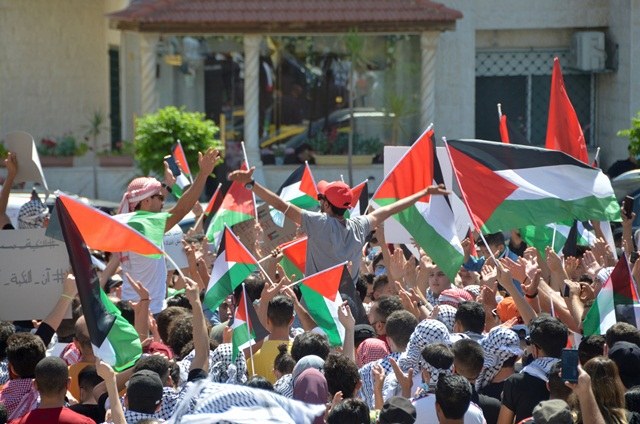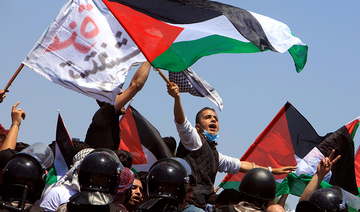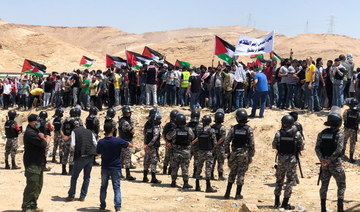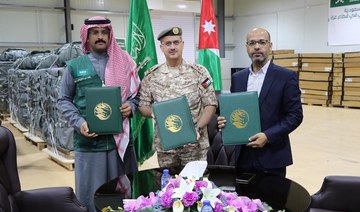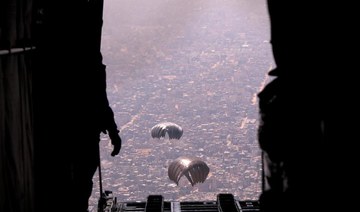AMMAN: Jordanian MPs on Monday called for Israel’s ambassador in Amman to be expelled in response to “Israel’s crimes against humanity.”
Almost all lawmakers who took the podium during Monday’s special session on the violence in Gaza and the occupied West Bank urged the government to expel the envoy following Israel’s actions in Jerusalem and subsequent bombing campaign.
Jordan is the custodian of the Islamic and Christian holy sites in Jerusalem’s Old City.
Ninety MPs out of Jordan’s 130-strong lower house of parliament signed a memorandum requesting the expulsion of the Israeli ambassador in Amman as a sign of protest and rejection of Israel’s “brutal and barbaric” attacks on Al-Aqsa Mosque and Gaza.
The petition, a copy of which was seen by Arab News, calls on the government to adopt a bold stance toward cutting diplomatic ties with the “Zionist entity” by expelling the Israeli envoy and recalling Jordan’s ambassador in Tel Aviv.
Last week, the Jordanian government said it had summoned the Israeli charge d’affaires in Amman to object to the “Israeli assaults against Al-Aqsa Mosque worshippers and East Jerusalem’s Sheikh Jarrah neighborhood.”
Other MPs demanded the cancelation of all agreements with Israel, including the 1994 Jordan-Israel peace treaty and the gas deal between the two countries.
In 2016, Jordan’s National Electric Power Company signed a 15-year agreement with Noble Energy, a Houston-based company that holds the largest share in the Israeli Leviathan gas field, to buy $10 billion of natural gas.
The government at the time said it would import 250-300 million cubic feet of natural gas per day from Noble Energy, adding the deal would save the kingdom around $990 million. Under the agreement, Jordan will receive 3 billion cubic meters of gas per year.
Other deputies, mostly of Islamist leaning, hailed Hamas’ “acts of resistance,” and called for action against Israel in the International Criminal Court for war crimes and crimes against humanity.
Prime Minister Bisher Al-Khasawneh, who attended the session, said that Jordan has its own legal and diplomatic toolbox to deal with the Israeli attacks on Gaza, Jerusalem and the West Bank, adding: “All options are on the table.”
Al-Khasawneh said that some of these diplomatic options will be used to protect Palestinians’ rights and others to highlight Israel’s violations.
The prime minister accused Israel of committing crimes against humanity, and said that Jordan’s unwavering position on the long-running conflict is rooted in the three “no’s” declared by King Abdullah: No to giving up Jerusalem, no to dropping the right of return for Palestinians, and no to the resettlement of Palestinians in Jordan.
With some MPs threatening the government with a no-confidence motion if it fails to expel the ambassador, Al-Khasawneh said that the “government will examine all options and will take the right action that serves the national interests once it receives the parliamentary petition.”
Sheikh Jarrah
A group of MPs also requested that a parliamentary delegation visit Sheikh Jarrah to deliver a message to the world’s parliaments on what they termed the “injustice exercised against the Palestinians” in the East Jerusalem neighborhood.
In a memorandum submitted for immediate action, 100 MPs demanded that a parliamentary delegation be formed to visit Sheikh Jarrah with the aim of supporting the Palestinian presence in Jerusalem and reaffirming Jordanian custodianship of the Old City’s holy shrines.
Al-Khasawneh said that the government has provided the Palestinian Authority with documents on Sheikh Jarrah to help the Ramallah-based government address Israeli “demographic change” practices in Jerusalem.
During a visit to Ramallah on April 22, Jordanian Deputy Prime Minister and Foreign Minister Ayman Safadi submitted documents to PA President Mahmoud Abbas proving Palestinian ownership of Sheikh Jarrah.
Jordan administered the West Bank, including East Jerusalem, until the June 1967 Arab-Israeli war, but remains custodian of the holy sites in Jerusalem.
Safadi’s trip to the occupied West Bank came after families were reportedly given court orders to leave their homes in the predominantly Palestinian neighborhood of Sheikh Jarrah by May 5 or face eviction.
“We have provided all the documents that we have that can help the Palestinian residents to preserve their full rights. Jerusalem is a red line for Jordan, the king and our people, as it is a red line for the state of Palestine. We will confront any effort to undermine the existing historical and legal status of the Islamic and Christian holy sites in Jerusalem,” Safadi was quoted as saying following his meeting with Abbas.
In response to some deputies who claimed that the government has failed to submit all registration documents to the Palestinians, Safadi said: “This is untrue. The government has checked every relevant paper in the (national) archives and has submitted all documents to the Palestinian people and government, and has also attested all the documents handed to the Sheikh Jarrah’s residents proving their ownership of their neighborhood.”
At a meeting with MPs on Sunday, King Abdullah said that “no country is more supportive of the Palestinians than Jordan,” adding that intensive talks were underway with active international stakeholders to stop the Israeli escalation, and safeguard Palestinian lives and property.



